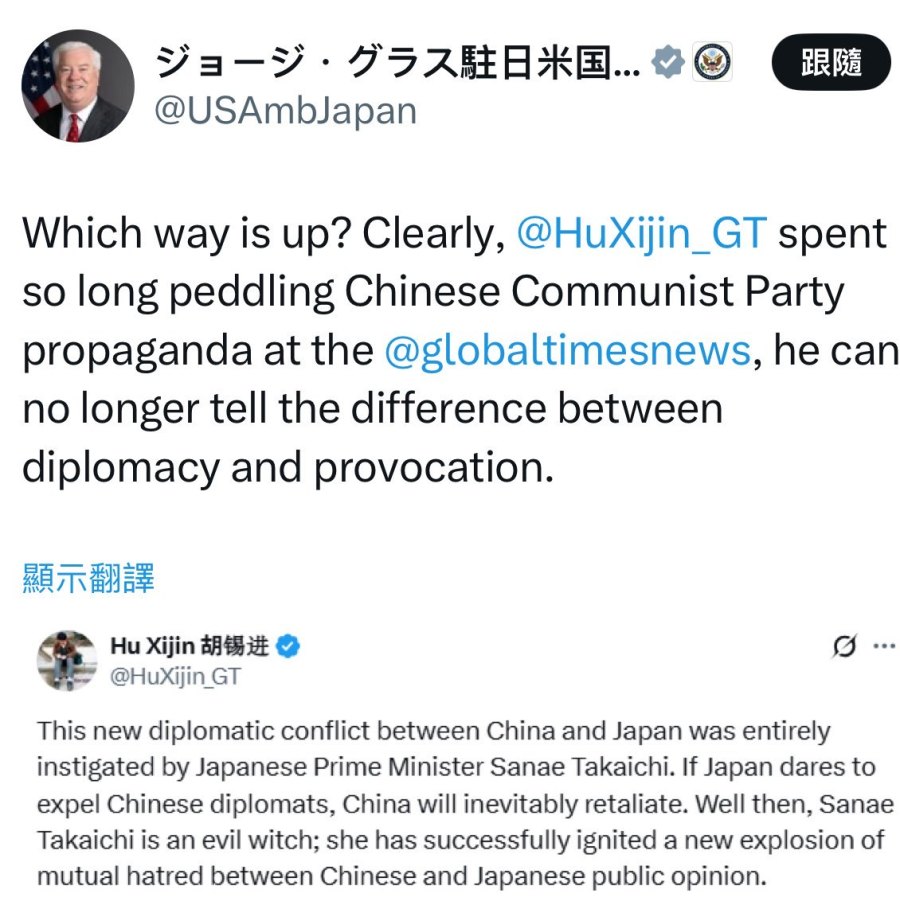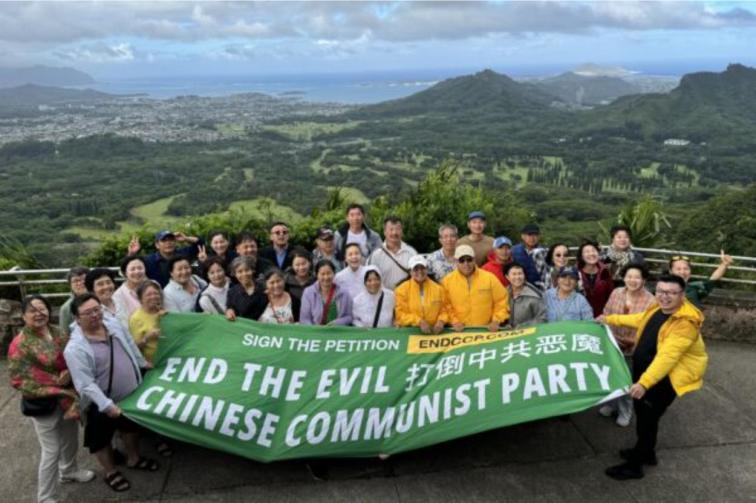Former Global Times editor Hu Xijin faced backlash from U.S. Ambassador to Japan George Glass on November 13 after his post on X. (Internet screenshot)
[People News] The controversy sparked by the "beheading theory" proposed by Xue Jian, the Chinese Consul General in Osaka, is intensifying. Hu Xijin, the former editor-in-chief of the Chinese Communist Party's official media outlet, the Global Times, has also contributed to the turmoil. On November 13, he took to X to angrily label Japanese Prime Minister Kato Sannae as the "evil witch" who instigated the conflict. U.S. Ambassador to Japan, George Glass, entered the fray to counter Hu Xijin's remarks. In response to Beijing's demand for Kato Sannae to retract her statement that "Taiwan's situation could pose a crisis for Japan's survival," Japanese Foreign Minister Toshimitsu Motegi stated at a press conference on November 14 that Japan would not retract.
On November 13, Hu Xijin posted on X, asserting: "This new diplomatic conflict between China and Japan was entirely instigated by Kato Sannae. If Japan dares to expel Chinese diplomats, China will certainly retaliate. Thus, Kato Sannae is an evil witch who has successfully incited a new wave of hatred between the Chinese and Japanese people."
In response, U.S. Ambassador to Japan George Glass also "joined the battle," sharing a screenshot of Hu Xijin's article on X and sarcastically commenting: "Clearly, Hu Xijin has been so entrenched in propagandising for the CCP in the Global Times that he can no longer tell the difference between diplomacy and provocation."
On November 12, the social media account "Yuyuantan Tian" under the Central Chinese Television (CCTV) not only referred to Gao City as "Gao Shi" using a homophone, but also resorted to vulgar language to insult Gao City, asking, "Has your head been kicked by a donkey?" and "Full of nonsense," which sparked an uproar internationally.
Late on November 13, Sun Weidong, the Deputy Minister of Foreign Affairs of the People's Republic of China, summoned Japanese Ambassador to China, Konishi Kenji, to protest Gao City's statement that "Taiwan has issues" and demanded a retraction.
In response, on November 14, Japan took similar action. The Deputy Minister for Foreign Affairs, Funakoshi Takehiro, summoned the Chinese Ambassador to Japan, Wu Jianghao, that afternoon to strongly protest against the beheading remarks made by Xue Jian, the Consul General of the People's Republic of China in Osaka, and demanded that Beijing take appropriate measures.
On the same day, the Foreign Affairs Group of the Liberal Democratic Party and the Foreign Affairs Investigation Committee compiled an opinion paper regarding Xue Jian's comments on the social media platform X about Prime Minister Gao City. They called for relevant party members to refrain from attending events hosted by the Osaka Consulate General, which will be communicated to the party through the chairman of the Political Research Committee, Kobayashi Takashi, in the near future.
The Foreign Affairs Group also revealed that the Osaka Consulate General plans to hold a Japan-China friendship event in Hiroshima Prefecture on the 21st.
According to reports from the Liberty Times, Japanese Foreign Minister Motegi Toshimitsu emphasised at a press conference on November 14 that Japan's actions are lawful and comply with international law, asserting that there is no issue of provoking China. He stated that this is part of Japan's security policy, and therefore, Japan has no reason to retract its statements and absolutely no need to do so.
Mogi stated that the content of Prime Minister Koizumi's inquiry is grounded in existing Japanese law, which clearly defines the circumstances that constitute a crisis threatening survival, the timing of such recognition, as well as the legal definitions, background, and applicable criteria. These aspects have been thoroughly discussed in the Diet's deliberations on the 'Peace and Security Legislation.' Japan's position has consistently remained unchanged, and there is no issue of provoking China.
He pointed out that China's claims differ from Japan's stance, and Japan has provided a clear explanation to China on this matter, refuting China's assertions as inconsistent with the facts. He emphasised that Prime Minister Koizumi's inquiry simply indicated that instability in the Taiwan Strait would negatively affect Japan's security, which does not signify a change in policy or a challenge to China's sovereignty.
Regarding the potential listing of Xue Jian as an 'unwelcome person,' Mogi remarked that the Osaka Consul General's post was indeed 'extremely inappropriate and regrettable.' However, the decision to implement such a measure requires a comprehensive assessment, and he hopes to avoid any negative impact on Japan-China relations, thus initially requesting Beijing to take appropriate actions independently.
Additionally, on the 13th, Japan's Ministry of Defence confirmed that three Chinese military vessels passed through the waters off Kagoshima Prefecture at the southern tip of Kyushu Island on the 12th, entering the Pacific Ocean via the Osumi Strait. The vessels include the Type 055 destroyer 'Anshan,' the Type 054A frigate 'Linyi,' and the Type 903 comprehensive supply ship 'Dongpinghu.' The Japanese side dispatched aircraft and ships for distant monitoring and confirmed that there were no threatening actions. However, this development has also raised concerns about whether it is a response to Koizumi's remarks.
On November 14, the Ministry of Foreign Affairs of the Communist Party of China and the Chinese Embassy in Japan unexpectedly issued a notice urging Chinese citizens to 'temporarily avoid travelling to Japan this year due to the unstable public security situation in Japanese society.' The notice emphasised that 'Japanese leaders have openly made provocative statements regarding Taiwan, which has severely deteriorated the atmosphere for exchanges between China and Japan, posing significant risks to the safety and lives of Chinese citizens in Japan.'
On the 7th, in response to a question from a member of the House of Representatives' Budget Committee regarding 'what circumstances would be considered a crisis situation for survival in the event of a maritime blockade in the Taiwan Strait,' Gao Shiqi (Gao Shiqi) indicated that if a military attack were launched against Taiwan, accompanied by a 'naval blockade' using 'warships' and other coordinated actions, it could be classified as a 'crisis situation for survival' that would justify the exercise of collective self-defense rights.
On the 8th, Xue Jian, the Consul General of the People's Republic of China in Osaka, posted on X, stating, 'For that kind of dirty head that reaches out aggressively, the only option is to cut it off without hesitation. Are you prepared for this?' This remark implied a 'decapitation' of Gao Shiqi and has provoked outrage among both the Japanese government and the public.
△










News magazine bootstrap themes!
I like this themes, fast loading and look profesional
Thank you Carlos!
You're welcome!
Please support me with give positive rating!
Yes Sure!